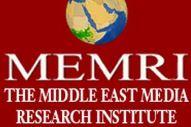Selective Memri
Against this backdrop, MEMRI's decision to translate this particular article is puzzling. Al-Khalidi is widely known as one of the most radical and venomous clerics in the Islamist discourse in Jordan, both with regard to Israel and the West and with regard to religion and state relations in the Arab world. Choosing to translate an article of his on the Jewish state - especially after the publication of translated articles by other Jordanian extremists - is tantamount to an Arab newspaper choosing to translate only a particularly nasty anti-Arab editorial of a right-wing Israeli newspaper or an op-ed by Isaac Shapiro and Yossi Elitzur, co-authors of the appalling "The King's Torah." Anyone who complained that such an Arab paper was biased and prejudiced in its coverage of Israeli affairs would be absolutely right.
MEMRI's publications on Muslim Brotherhood affairs in general also reflect this reality, as they are usually posted under the sub-category "Islamic Fundamentalism" on the institute's website and include a wide array of anti-Semitic articles. This selective choice of articles is all the more regrettable in light of fascinating developments that have taken place in the Islamist discourse in the Arab world following the "Arab Spring" - something that seems to have passed under Memri's radar in particular and that of the Israeli public discourse in general.
For example, even before the Arab Spring, the Jordanian Muslim Brotherhood's daily had published, from time to time, articles calling for the upholding of international agreements, including the peace treaty with Israel, and against Arab intellectuals who objected to cultural normalization with Israel. These articles were not translated by Memri's staff.
Notably, the Arab Spring has led to a more pragmatic discourse about Israel within Islamist circles in the Arab world. Tunisia's Islamist foreign minister, for example, refused to agree to the constitutionalization of the prohibition of "normalization" of ties with Israel. The Jordanian Muslim Brotherhood, which for years argued passionately that the nature of the conflict with Israel was religious and existential rather than national and territorial, suddenly convened experts for a long discussion entirely devoted to the claim that the conflict with Israel was political rather than religious. The Muslim Brotherhoods of both Egypt and Jordan are toning down their criticism of the peace treaty with Israel and avoiding provocative statements against peaceful relations. There and elsewhere in the Arab world they are also publicly maligned for an allegedly implied acceptance of Israel within the pre-1967 borders.
These developments might not "represent" the core of Islamist ideology with regard to Israel and Zionism. But ideology is affected by reality, and political realities in the Arab world have now changed beyond recognition. A "Media Research Institute" cannot justify such a one-dimensional choice of anti-Semitic articles, which fit squarely and conveniently with Western interpretations of political Islam, while it ignores articles and events, some quite surprising, which challenge these entrenched images and mark the beginning of the long process of adaptation of the Muslim Brotherhood to power.
MEMRI's Hebrew credo is "know thy neighbors and make peace with them." One can only expect that such an institution, as well as other news sources, would present a more nuanced picture of the changes taking place in the Arab world in the wake of the Arab Spring.
By Dr. Assaf David
Dr. Assaf David is a research fellow at the Truman Institute for Peace and an adjunct lecturer in the Hebrew University's political science department. This opinion piece originally appeared in Hebrew on the Can Think website (canthink.co.il) on July 20, 2012.

